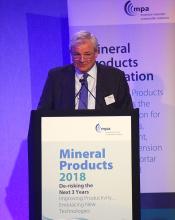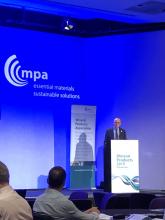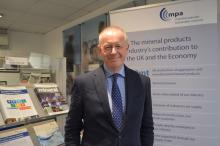The
The event, themed ‘Facing the Challenges… Showcasing the Industry’ attracted a packed audience of 180 high level delegates from over 90 member companies and valued stakeholders.
Held on Wednesday 7 June, the day before the General Election, the event was hosted by BBC Radio 4 Today programme presenter, Justin Webb, and broadcaster Andrea Catherwood, who both managed expert panel discussions.
MPA chairman Simon Vivian, in his opening address, confirmed that “our industry continues to be ready to support delivery of Government’s agenda for developing and improving the built environment in post Brexit Britain”.
Vivian continued: “Consequently, our industry’s attention is focused upon the need for confidence-boosting measures which encourage investment to maintain growth in the economy and improved productivity. A healthy and prosperous economy underpins our ability to meet the needs of both the private and public sector.
A modern and relevant Industrial Strategy can play a part here, but it must be one that encourages all industries throughout the UK. Government need not pick winners: it should focus upon choosing and creating the right conditions that encourage investors, entrepreneurs and risk takers to invest.
Reducing the tax burden and cutting and improving red tape can play an important role and will help us improve productivity and maintain competitiveness for the benefit of the economy and our quality of life.
Our industrial competitiveness must be protected at all costs, which is why the ultimate shape of the deal with the EU matters, as this will define access, not only to important European markets, but more significantly to both skilled and ‘less skilled’ labour.”
The event also marked the official launch of the MPA’s new Charter. Signed by all MPA full producer members, it is designed to help the industry achieve a new vision for 2025 by ‘driving change, raising standards and improving perceptions’.
Sir Simon Fraser, managing partner of Flint Global, gave the keynote speech focussing on the world in flux, commenting that the ‘nature of change is changing’, and that every year is now a revolutionary year and that the pace of change leads to loss of confidence in quality of political leaders and their ability to deliver.
Sir Simon, Vicky Pryce, a Board Member of the Centre for Economics and Business Research, and Jessica Gladstone, partner at Clifford Chance, discussed Brexit and the likely view from Europe. Jessica Gladstone indicated that, whilst the UK perceives that a deal can be done in two years, this is not widely reflected across Europe. Vicky Pryce noted that, following recent European election results, fears of the break-up of the EU have mostly gone away. Sir Simon highlighted that the question of the Irish border is of vital importance and there must be more focus on the relationship between UK and Ireland.
Professor Vernon Bogdanor from Kings College London, Josh Hardie, deputy director-general for Policy and Campaigns at the
Andrea Catherwood facilitated a discussion between James Warren, research fellow at National Institute Of Economic and Social Research, and Luc Tucker, senior analyst,
Commenting Nigel Jackson, chief executive of the MPA, said: “The day helped delegates appreciate the wide range of challenges facing the UK in the coming months and years from a global, European and UK perspective. It is clear that Government should be listening more to experts who really understand the ‘nitty gritty’ issues relating to international trade and business and industry, with regards to the economy. There appears to be a lack of ‘hands on experience’ in Government, verging on ignorance of what it takes to set and run long term businesses at any scale which are vital for jobs and the taxes that pay for public services. Let’s hope that the new Government taps into the vast amount of goodwill and ‘can do’ resources available to them from industry. It is in everyone’s interests to secure a successful Brexit. We need a lot less political dogma and lot more pragmatism and collaborative working as we leave the EU.”










